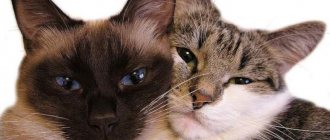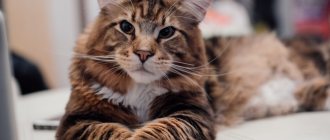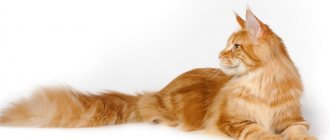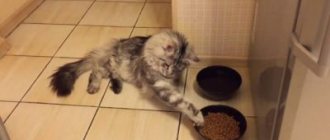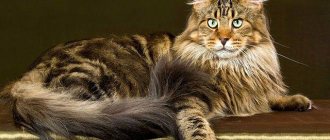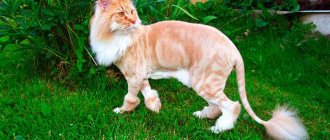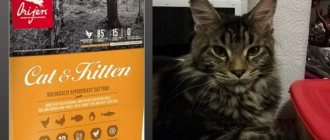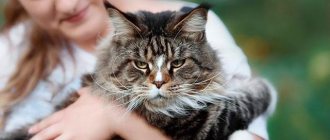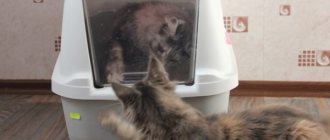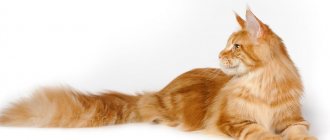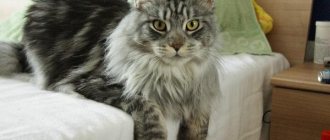The health status of an adult cat is determined by various criteria - from the animal’s behavior to the quality of its fur. But some diseases cannot be detected by external signs. For example, the correct development of a Maine Coon kitten can be judged by how much it weighs. Therefore, a responsible owner must carefully monitor the growth of his pet using special tables.
Size standards and maximum weight
These animals are rightfully considered the largest domestic cats among those breeds that are able to live with humans without any problems. All four-legged champions and record holders for weight and height are Maine Coons. They have significantly outgrown the rest of their competitors. The average weight of representatives of this breed is 8-10 kg for males and 4-7 kg for females.
Like other native species, big Manx cats mature late. They enter a sexually mature state quite quickly - females can give birth to offspring already at the age of 7-9 months, but Maine Coons grow up to 4-5 years.
At the age of 5 years, the weight of a Maine Coon cat remains almost unchanged. As soon as a pet loses its appetite, loses weight and becomes lethargic (even in the absence of other signs of illness), it needs to be shown to a veterinarian in order to exclude the development of diseases, which often pass in a latent chronic form, but necessarily manifest themselves in later stages.
This is interesting! A cat named Omar became a contender for entry into the Guinness Book of Records. By the end of the first year of his life, he had already gained 10 kg, and later each year he added one more. Now the title candidate is 4 years old, the actual body length of this Maine Coon is 1.2 meters and, standing on his hind legs, he can easily take food from the dinner table.
What does a kitten's weight depend on?
During the first two months of a kitten’s life, it is recommended to weigh it daily, and once a week after reaching two months of age. In this case, it is advisable to perform the procedure at the same time of day.
To monitor normal development, you can use the following table of a kitten’s weight by month. It is worth considering that an alarming signal is not only low, but also excessively high weight, which may indicate poor nutrition, a sedentary lifestyle, hormonal disorders and other problems.
The following factors influence the baby's weight:
- Breed. To control the weight of kittens by month for large breeds such as Savannah, Maine Coon or Ragdoll, special tables should be used.
- Floor. After several months of development, boys overtake girls in size and weight.
- Number of kittens in the litter.
- Balanced nutrition for cats during pregnancy and lactation.
- The presence in the kitten’s diet after switching to independent feeding of the entire complex of necessary vitamins, minerals and other substances.
- General health. Diseases and the presence of parasites can lead to developmental delays.
What is the weight of an adult Maine Coon: the difference between a cat and a cat
In adult Maine Coons, there are significant differences between the weight and height of male and female cats:
- Cats are heavier and longer. A 3-month-old Maine Coon should weigh more than 2 kg, a one-year-old - from 6 to 8.5 kg. Castrated males traditionally exceed the average by another 2-3 kg. This is due to the lack of sexual activity.
- Cats are always smaller and more graceful than males. At 3 months they should weigh about 2 kg, and by the year they gain on average up to 5 kg. As adults, sterilized cats “eat” another 3 kg.
Most often, the weight of an adult Maine Coon cat is around 6-7 kg. Veterinarians do not recommend going beyond these averages, and in case of overeating or weight gain for other reasons, the animal is prescribed a gentle diet or fasting days.
Other differences between a cat and a female cat are in the area of external characteristics that do not depend on the size to which the Maine Coon grows.
Important! Felinologists have compiled a special monthly weight table for Maine Coons. Deviation from it means the presence of problems with health and general development.
How to raise a furry giant
The weight and developmental characteristics of the Maine Coon are determined by a number of circumstances. Some of them depend only on Mother Nature, others can be influenced by the person caring for the kittens.
What influences the development of the baby coon?
- Gender of the kitten. Small cats are born larger than their sisters and gain weight faster.
- Weight and dimensions of the mother cat. The larger the mother, the larger her kittens are at birth and the faster they develop.
- Condition of the kitten at birth and in infancy. If a baby baby was born weak and prone to illness, it will grow slower than its brothers and will weigh less than them. But this circumstance does not prevent the smallest kittens in the litter from turning into huge cats weighing 10 kilograms.
- Number of kittens in the litter. The more kittens are born, the less each of them weighs compared to kittens from a small litter.
- Genetics. The length, weight and overall development of a kitten are influenced not only by maternal genes, but also by the heredity of the father. Therefore, kittens of the same cat, born from different cats, may differ in size at birth, and subsequently in the speed of development.
- Nutrition for a nursing mother. The more complete and varied the diet of a mother cat, the healthier and larger her kittens will be.
- Conditions for keeping a nursing cat family.
- Stressful situations. Any disturbances (noise, presence of other animals, change of place of residence) can affect the development of kittens. A stressed female may stop feeding her offspring, which leads to a change in the diet of growing animals, causing them to gain weight more slowly. A hormonal surge during stress also leads to the same consequences, and this applies to both cats and kittens.
Good to read: Don't like fish in cat food? But in vain!
Maine Coon weight by month
Newborn Maine Coon kittens weigh from 120 to 180 grams, although very small (80 g) animals are often viable. Experts distinguish 2 initial stages of kitten growth:
- Neonatal cycle – first 4 days. At this time, development is highly dependent on the complexity of labor and birth order.
- Sucking month. The only food for the baby is mother's milk and in any case adds at least 10 g to the baby's weight every day. But the normal value is 5-8 times more (50-80 g/day).
Girls weight
The average weight of a newborn cat is 100-150 g.
- In the first month of life, this figure reaches 600-700 g. Small cats can weigh 0.55 kg, and larger individuals can weigh up to 0.75 kg.
- At 2 months the values double again - 1.0-1.55 kg.
- At 3 months, a Maine Coon (girl) should already weigh 1.5 - 2.3 kg and then add about 40% of total body weight every 30 days.
By 6 months (3-4 kg), active weight gain stops - now before a year, cats will gain another half weight and should weigh from 4.5 to 6 kg. At this age, Maine Coon girls grow more slowly than boys.
Boys weight
The average weight of a newborn male is 150 g. In the first weeks of life, the baby should gain about 40% in weight. At the age of 1 month, a Maine Coon kitten should weigh 0.7-0.8 kg.
Then the cat’s body weight increases evenly. At 4 months the weight of a Maine Coon is about 4 kg. Every next 30 days brings an additional kilogram. It's very easy to remember. At 5 months, the Maine Coon weighs 5-6 kg, at 6 months – 6-7 kg, and at 7 months, the Maine Coon should still weigh the same 6-7 kg (or a little more), because the period of active growth has ended.
By the year the cat will add a couple more kilograms, and all further records will be set only closer to the stage of full adulthood - after 3 years.
Table
Maine Coon weight by month (feline and male development chart):
| Age | Boys (kg) | Girls (kg) |
| At birth | 0,15-0,18 | 0,12-0,15 |
| 1 Week | 0,2-0,25 | 0,2-0,25 |
| 2 weeks | 0,3-0,35 | 0,3-0,35 |
| 3 weeks | 0,45-0,5 | 0,4-0,45 |
| 1 month | 0,65-0,8 | 0,55-0,65 |
| 2 months | 1,2-1,5 | 1,0-1,3 |
| 3 months | 1,9-2,4 | 1,5-2,0 |
| 4 months | 3,3-3,8 | 2,8-3,3 |
| 5 months | 4,0-5,5 | 3,5-4,0 |
| 6 months | 5,0-6,5 | 4,0-4,5 |
| 1 year | 6,0-9,0 | 5,0-6,5 |
| 2 years | up to 10.0 | up to 7 |
| 3 years | 12,0-13,0 | 7,5-8,0 |
*All data on the weight of small Maine Coon kittens should be considered as an example only. The development of animals depends on the conditions of detention, nutrition, physical activity, health and other factors.
Nutrition
When purchasing a small Maine Coon, it is better to feed him his usual food for a while. Then you can introduce the kitten to other foods.
A complete diet for a small Maine Coon should contain up to 40% protein, 15-30% fat, 2.5% fiber, and the rest should be carbohydrates.
When feeding kittens, it is important to follow a diet. The main diet is raw lean meat. These are beef, chicken, rabbit, and offal. To strengthen joints, you need chicken scallops, beef tendons, and pig ears. Meat should be frozen for at least three days.
The source of minerals will be raw chicken necks, heads, backs, paws, and tails. They must be ground or given whole. Raw yolk is very useful for kittens.
When purchasing a small Maine Coon, it is better to feed him his usual food for a while
Fish should be given with caution and infrequently. Kittens drink milk for up to two months, and then their body loses the ability to digest lactose. It is replaced with fermented milk products, cottage cheese, and hard cheese.
Sometimes kittens happily eat raw grated vegetables and fruits and herbs. Adding a small amount of olive oil will help. There must be clean water available at all times.
It is not recommended to feed kittens food from the human table: it contains too many different additives that are harmful to the animal’s digestion.
Natural nutrition table for Maine Coon kittens by month
The nutritional norms and diet for Maine Coon kittens are presented in the table:
| Age in months | Daily value in grams | Number of feedings per day | Diet |
| Up to a month | Around the clock | Mother cat's milk | |
| 1,5-2 | 150-190 | 6 | Milk, liquid porridge, pureed meat |
| 2-3 | 180-240 | 4 | Raw lean meat, liver, some sea fish, vegetables, fruits, egg yolk, kefir, yogurt, a little olive oil. |
| 3-6 | 180-220 | 4 | Offal, chicken feet, heads, backs are added |
| 6-9 | 200-250 | 3 | Same diet |
| 10-12 | 180-220 | 2 | Same diet |
Feeding kittens with prepared food
High-quality industrial cat food contains all the necessary nutrients. Some manufacturers produce special food for Maine Coons: Bosch Sanabel Kitten, Royal Canin, Hills.
Be sure to read:
What to feed a Maine Coon kitten: recommendations, diet from a month to a year, what not to give
The amount of dry food is calculated individually and depends on the size of the kitten. First, the granules should be diluted with store-bought milk. Adults can be given canned food.
Industrial feeds are stored for a long time and are convenient to use. The packages usually indicate the serving size and other recommendations.
Maine Coon height and weight by month
Unlike the table of a kitten’s weekly (monthly) weight gain, none of the experts describes the growth of the Maine Coon in detail. In fact, the development of the animal occurs unevenly - during the first weeks the cat really quickly increases in size and overtakes its outbred peers.
Also, a lot depends on the conditions of detention - an active Maine Coon, not limited in movement and games, always develops better than pets who live in more modest conditions. But later nature will put everything in its place.
The dimensions of an adult Maine Coon are approximately the same. Its length is about 1 m, and its height at the withers is 30-35 cm. Giants grow up to 40 cm or more, but these are truly rare specimens. Sometimes they try to compare the size of an adult cat with the height of a person (child), but this is completely wrong. The length of the Maine Coon takes into account the parameters “from tip to tip” (nose to tail), and its body is not so impressive. At 8 months, the Maine Coon's weight approaches 7-8 kg, and its height already allows it to rise on its hind legs and take food from the table.
This is interesting! Champion Maine Coons allegedly grew up to 1.35 m in length, but such rumors have not been officially recorded anywhere. And the current record holder has impressive dimensions - his height of 123 cm is confirmed by the Guinness Book of Records.
What affects growth
The cat grows up to 3-4 years, during which time the body length reaches an average of 1 meter. Of the recorded records, the longest cat in the world is 123 cm. There have been cases when the animal reached 135 cm.
In cats, the height at the withers is 30-40 cm. Parameters such as the weight of the cat and its size do not depend only on the health and gender of the kitten. High-quality care and proper nutrition for Maine Coon cats, timely examinations, living conditions, these are the factors influencing the weight of the animal.
It is important to monitor the health of your pet and select a diet according to age. The food must be of high quality. The maximum portion that a pet eats should not exceed 250 grams.
For boys and girls the figure is approximately the same. Meals should be divided into 4 servings up to a year and limited to 2 meals after. Do not feed the animal to a huge size; a fat cat is more susceptible to disease. Proper care not only ensures proper development, but also significantly prolongs life.
How old do Maine Coons grow?
Maine Coons grow up to 5 years old. In some individuals, this process is completed earlier - it all depends on the conditions of detention, nutrition and genetic data of the cat. For example, the table indicates that at 3 months a Maine Coon should weigh 2-2.4 kg, but the scales show the owner other, lower numbers. If the baby is healthy, then there is no need to worry - over time, the Maine Coon will gain the missing kilograms.
In Maine Coon cats, monthly weight gain may also differ from the data indicated in the table. Most often this happens closer to the year, when females enter the puberty phase. At this time, all efforts are devoted to the formation of internal organs, and growth slows down. Later, after the first mating, the cat can quickly recover and even grow.
Important! An indirect indicator of how big a Maine Coon will grow is its parents. Large offspring are always born from equally tall and heavy male cats.
Birth weight
Maine Coons are the largest domestic cats in the world.
Their kittens at the time of birth weigh on average about 115-120 g. Girls are born smaller - 85-145 g, boys - 100-170 g.
Maine Coons are the largest domestic cats in the world
It has been observed that large newborn Maine Coons grow faster than their smaller counterparts.
Why is my cat not growing or losing weight?
The main reasons that affect weight loss or slow growth of a Maine Coon include:
- Small Maine Coon kittens, which are the last born in the litter, usually weigh less and cannot compete for mother's milk on an equal basis with the rest - owners have to carefully monitor that each cub receives its portion of food.
- The weight of a Maine Coon may differ by 10-20% from the weight indicated in the tables and there is nothing to worry about. But if the situation does not change over a long period of time, then you should contact a veterinarian.
- Timely treatment for external and internal parasites reduces the risk of weight loss in Maine Coons.
- In the formation of a Maine Coon, its lifestyle plays an important role - active games and appropriate physical activity help improve the growth of the animal.
A healthy Maine Coon always grows to 5-8 kg, and further weight gain will depend on the conditions of the cat’s keeping and nutrition.
For what reasons does a cat baby not gain weight?
If a kitten is developmentally delayed and does not gain weight, there may be several reasons for this:
There can be several reasons for Maine Coon kittens losing weight.
- Poor nutrition for a nursing cat. During this period, the female must be given special food for lactating cats at least 3 times a day. Self-preparation of food is allowed: fresh fermented milk products, lean meat, occasionally fish, eggs, vegetables, additional vitamins prescribed by a doctor.
- Lack of milk in the mother or lack of strength for sucking in the kitten. If the owner is sure that this is the cause of the weight deficiency, they should resort to artificial feeding of the kittens with cat milk substitutes.
- Toxic mother's milk. A cat's milk can harm the baby if it suffers from diseases such as mastitis, metritis, or uterine abscess. Also, certain medications can make milk toxic, so you should consult your veterinarian before starting any treatment.
- Lack of nutrients in milk and anemia.
- Worms. A kitten can become infected with parasites from its mother through milk. If the baby is infected with worms, then normal weight gain is almost impossible.
- Genetic deviation. Possibly in one kitten from a litter, even if all the others are healthy.
- Disease. The disease can be of a different nature, transmitted from the mother or occur independently. You should immediately contact your veterinarian if underweight is accompanied by any of the following symptoms: temperature above 39°C, vomiting, diarrhea, discharge from the eyes, plaintive meowing.
- Crossing a female with an outbred male. Breeders exclude such cases, but if this happens, then the deficiency in the weight of the cub may be due to this circumstance.
What to do if your cat is not gaining weight
During the first two months of life, a young Maine Coon's weight should be monitored weekly. Any prolonged deviation from the norm becomes a reason for a visit to the veterinarian.
Throughout each year of an adult Maine Coon's life, its weight is monitored. At the same time, excess weight is also dangerous for the health of the animal.
The big cat sometimes becomes capricious, refuses food and even loses weight. If it comes to the nature of the Maine Coon, then you can give the cat fasting days, and after that gradually change the diet. However, a prolonged departure from the weight gain schedule is an alarming sign that may indicate the development of a serious pathology in the animal’s body. In this case, the cat needs to be taken to the vet immediately.
But most often, representatives of the Maine Coon breed have good health, excellent genetics and powerful immunity. They are sociable and do not require special conditions. All the future giant needs is the love and attention of its owner, and the strong cat will definitely gain weight.
Health of raccoon kittens
Maine Coon cats have enviable health.
The breed was formed in the harsh conditions of the American state of Maine as a result of natural selection, where only the strongest and hardiest animals survived.
To maintain the health of a small pet, it is only important to follow the rules of keeping and carefully monitor its condition.
Key aspects of care:
- good nutrition;
- timely vaccination;
- antiparasitic treatment;
- regular bathing, brushing teeth and ears;
- combing wool.
Diseases
Maine Coon cats are prone to the following diseases:
- Pathologies of the cardiovascular system and joint diseases. A common cause of their development is overfeeding of pets, leading to obesity.
- Inflammation of the gums.
- Liver diseases.
- Ophthalmological diseases: blepharitis, conjunctivitis, keratitis.
- Urolithiasis disease.
- Development of inguinal tumor (in females).
At the first symptoms of any disease, you should immediately seek veterinary help.
Maine Coon cats have enviable health
Vaccinations
For preventive purposes, all Maine Coons must receive their first vaccination at 2.5 months. Subsequent vaccinations occur once a year. These are mandatory procedures.
A few days before vaccination, it is recommended to cleanse the intestines of parasites.
Teeth
Adult cats have very sharp and large teeth. Milk teeth begin to grow in kittens in the second week of their life; at three months of age, their number is 26.
At the age of 3-4 months, the teeth of young Maine Coons begin to change. The front incisors erupt first, followed by the sharp canines. Molars and analogues of “wisdom teeth” grow next.
The process of forming a full set of permanent teeth (adults have 30) lasts up to seven months. During this time, it is important to monitor the development of proper bite.
To prevent Maine Coons from gnawing foreign objects, you need to purchase rubber toys for them.
For the proper development of permanent teeth, it is important to feed cats food with a high content of calcium and phosphorus.
Be sure to read:
What to feed a Maine Coon correctly: an adult cat, a kitten or a female cat
Record holders
According to the Guinness Book of Records, the longest cat is the Maine Coon Stewie, whose full name is Stuart Gilligan. Its length was 123 cm. The record was set in the USA on August 28, 2010. Stewie died in 2013. The current record holder for length is another Maine Coon cat named Ludo, whose length is 118.33 cm.
Photo of Stewie:
